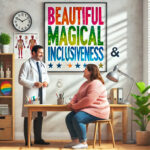Love knows no boundaries in recovery
Love knows no boundaries in recovery

by June Alexander and Holly Curtis
Love in all its forms is a vital element in healing. When illness and trauma enter our lives, negative emotions and behaviors can overtake and immobilize us, but love can help us find a way through. Reconnecting with people, places, pets, things and activities, and remembering anyone and anything that has brought true love into our life, can be a powerful recovery agent. Love reminds us that we are worthy, that there is beauty in the world, and that we can create and generate our own love.
One of my favorite early childhood memories is of the love shown by my paternal grandmother, who allowed me to help her with the clips on her corset when dressing in the mornings and to take the pins out of her bun when letting her lovely silver hair out to brush at the end of the day; she taught me how to knit at age seven, and this required much patience as I am left-handed; definitely, these early experiences of love help to sustain me through difficult times, even today.
Over the coming months, I invite you to participate in a special Dear Diary series on Leading with Love. Through sharing our experiences on how love has made a difference, we can help our own healing, and that of others. The wonderful thing about love is that it does not cost anything, and there is an endless supply. All that is required is that we are open to giving and receiving it.
Love needs regular nurturing
Often we get so caught up in the busyness and dramas of daily life, love can be pushed aside. We mistakenly think it can wait, that we don’t have time to give it or receive it. Or maybe, due to many pressures, we don’t think about it at all. But love is like a seed in the garden – it needs regular nurturing and tender care to grow and bloom and blossom.
I invite you to take time out to remember and remind yourself of those special moments when you have experienced love, and reflect on how you are nurturing these moments and strengthening them today, to fill your present life with love.
Exploring themes of love
To encourage you, on the fourth weekly post of each month, Dear Diary will explore a love theme. For instance:
- How do you like to receive love?
- How do you give love?
- Who do you, or did you, feel unconditional true love from?
- Animals that brought you love
- Childhood experience that brought you love
- Place or trip or activity that makes you feel loved
- Can you share an experience you know was/was not loving, and its effect on you?
- Ideas to generate and put love back in our lives
- How to rephrase confrontational/difficult questions/responses so they come off as concerning and loving versus accusatory
“We know when we feel real, pure love”
The inspiration for this Lead with Love series comes from Dear Diary contributor, Holly Curtis. Love played a big part in Holly’s personal healing and today she helps others through her work as a life coach. She writes:
“Pure love shines in our lives usually through the innocence of our childhoods, pets we love, special friends we treasure and beloved family members. We know when we feel real, pure love…it is undeniable.”
Holly, who receives regular calls from anxious parents worried that their child is regressing to the point where they can’t feed themselves, or follow their meal plans because they had the 24/7 crutch of program, says:
“Ideally, we must teach more skills before discharge, so the patient/client feels in control and hopeful.”
How leading with love can help both patient and caregiver
Holly believes one way to do this is through leading with love. She invites patients and their families to answer a few important love questions that include:
- How do you give love?
- How do you like to receive love?
- Who or what is real love for you?
A grandmother’s perfume
Sometimes, effects of denial of love and the development of self-abuse can occur at a young age. For example, a woman sought help after suffering for 40 years with laxatives. Adopted as a young child, she was big and tall and had red hair and looked nothing like other members of her family who were smaller in stature and different in appearance. Her adoptive mother controlled her food intensely so she “would not be so big.”
Holly describes how this woman was able to start turning her self-abusive actions into actions of self-love:
“I asked her to go into her heart and soul, and share with me when she felt real unconditional love. She teared up and said her grandmother — her mother’s mother.
I invited her to tell me about her grandmother and how she felt loved by her. She cried through our session because she said she had forgotten about her grandmother and her love. We worked on this over a few sessions. She brought pictures and memorabilia and the perfume she used to love to smell on her grandmother. I told her this is where her thoughts should go when she feels like purging/emptying her body of toxic waste and feelings.
We focused on filling her up from within…living from the abundant place inside her that knows true love. Then we began to work on relearning to love self, value self-worth and learn to self-soothe.”
Showing love opens windows in our soul
In another instance, Holly advised a mother to not sit and watch her recovering daughter struggle with the meal plan or finishing her meal, but instead to bring family photo albums to the dinner table. Opening the albums and remembering happy, carefree times before the onset of illness can provide a reminder of love and of who the person is above and beyond their illness. Also, this activity around story-telling and recall can assist the person with the illness in seeing who they were before the eating disorder developed and what the illness has taken from them.
Coming from a place of love in thoughts and actions
Families who are caring for a child or partner or parent recovering from an eating disorder can be confronted with and challenged by layers of fear, anxiety, frustration and anger. Such powerful, negative feelings can paralyze emotions, crush hope and limit ability to think clearly, cope or support their loved one.
To assist, Holly suggests a shift in focus. She believes the intensity can be alleviated through inviting all involved to come from a place of LOVE in all their thoughts and actions. Journaling can assist in acquiring this self-awareness skill, which requires you to pause before you act, think or express your feelings, to make sure what you do or say will come off lovingly.
One-step-at-a-time
Healing is a slow journey. It is a one-step-at-a-time kind of journey that you can take at your own pace, taking small risks one-at-a-time. I thank Holly for her initiative in proposing the ‘Lead in Love’ series and welcome her collaboration. Travel with us and allow love to light your way. Love will help replenish positive thoughts and feelings, so that your behaviors generate self-love and wellness.
To share your experiences and thoughts on leading with love, write to me at: june@junealexander.com
I look forward to your contributions,
With love,
June
About Holly: Holly Curtis believes love knows no boundaries, heals and can produce miracles. She is an author, (EDIT )™ Certified, life coach, ANAD (support group leader, mental health advocate, Northwestern University, Psychology BA www.hollyshealingheart.com hollycurtis63@gmail.com





